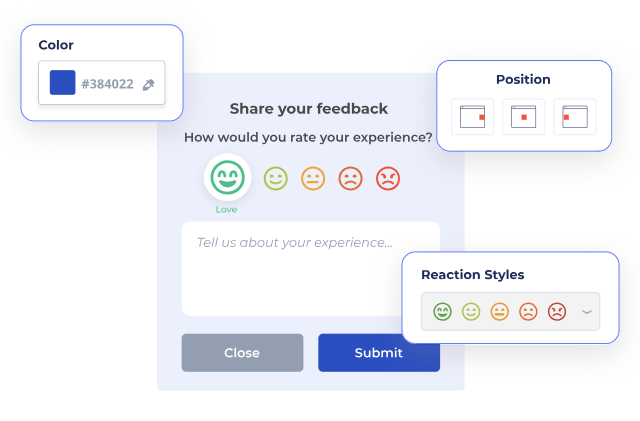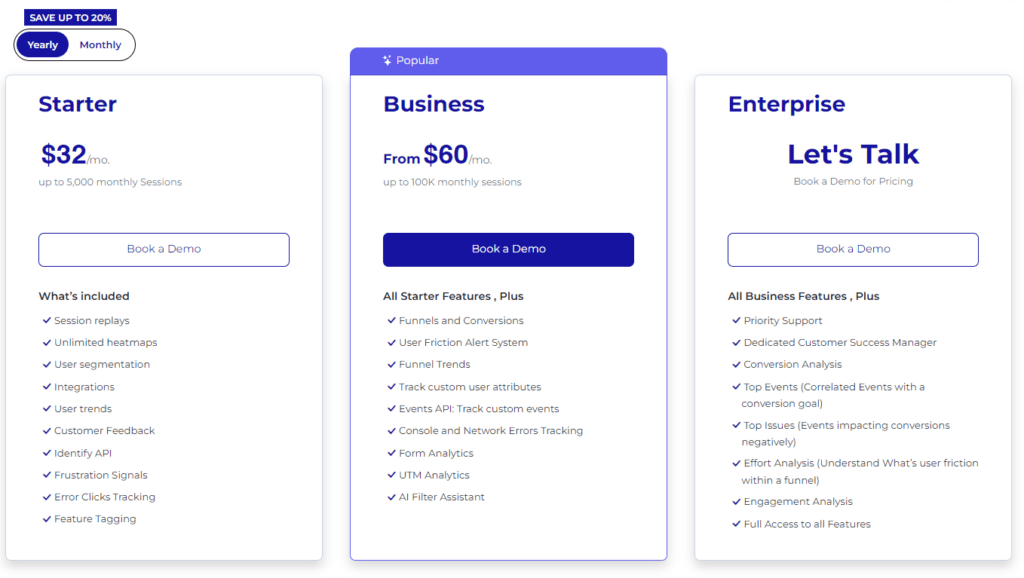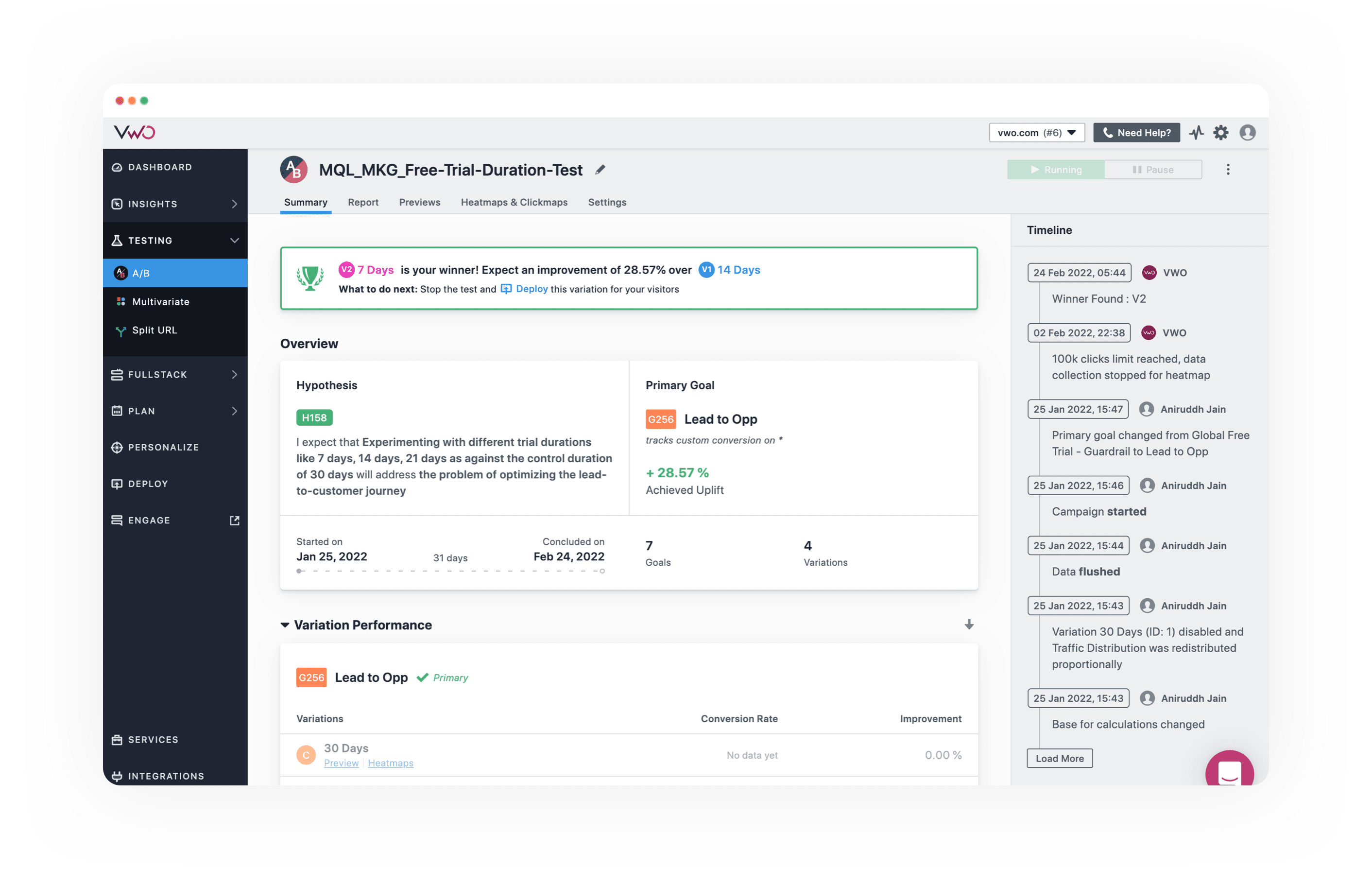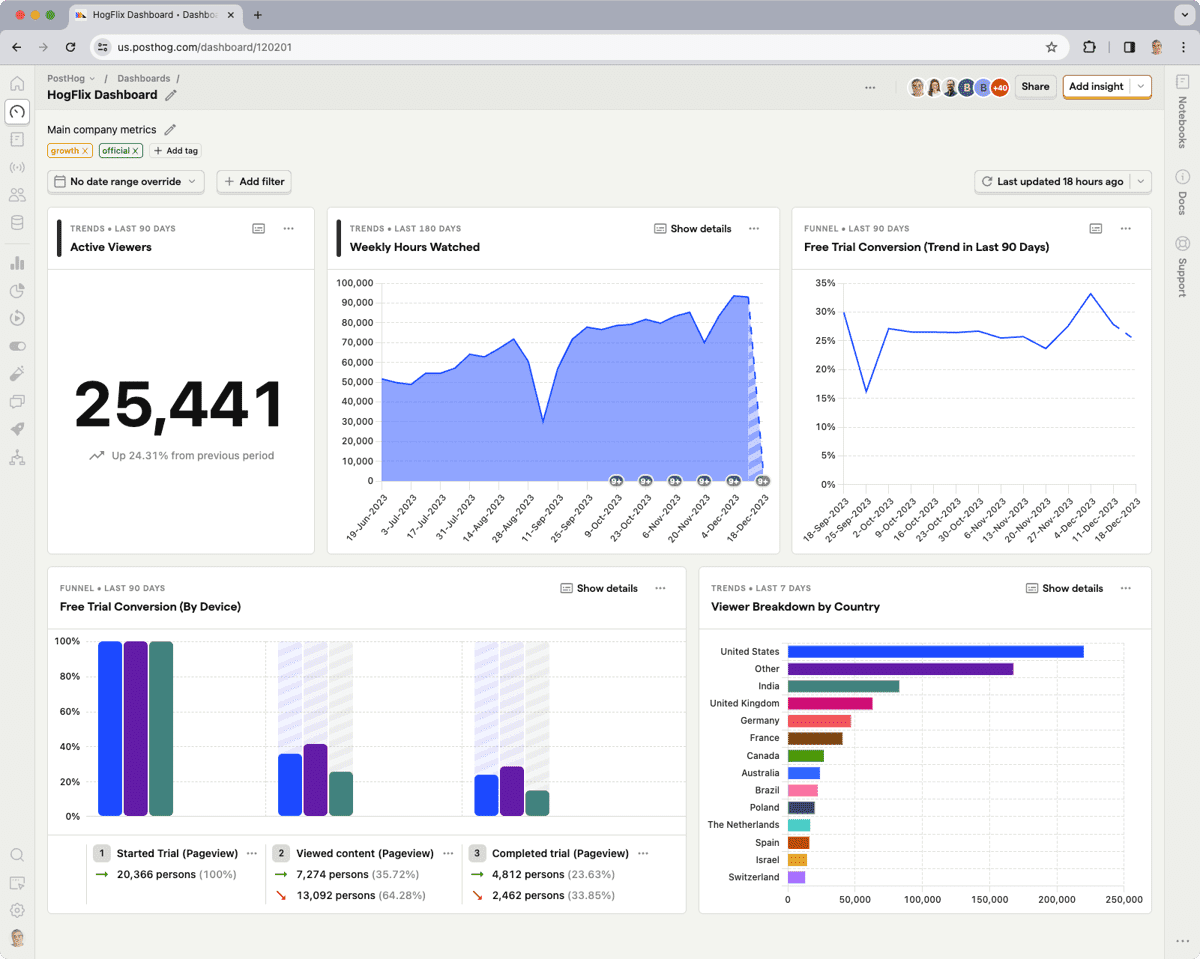Are you looking to optimize your website's performance but unsure if VWO is the right choice? You're in luck! We've compiled...

Website Retention Rate: Definition, Role, And 5 Quick Tips
Are you struggling to keep users engaged on your website? Well, you're not alone. With so much competition for online attention, retaining visitors can be a challenge.
Did you know that improving website retention can increase user satisfaction and conversion rates?
In this article, we'll show you how to do just that. Ready to boost your website's retention?
What Is Website Retention Rate?
The retention rate is like a scoreboard for your website. It tells you how many customers stick around after their first visit. Think of it as a way to measure how good you are at keeping visitors interested in what you offer.
The better the score, the more people come back, showing they liked what they saw and want more.
A high customer retention rate means customers enjoy their experience on your site. They're sticking with you instead of going somewhere else. This could lead to brand loyalty and can make your business stronger over time.
Keeping this score up is a big deal because it's cheaper to keep an existing customer than to find a new one.
Why Are User Retention Rates Important for Ecommerce Brands?
Understanding the retention rate is just the start. Websites need to keep visitors coming back. A good customer retention rate shows users like your site and want to stick around. It's a sign that you're doing something right in offering a valuable customer experience.
Websites with good retention rates can make more money over time. So, for e-commerce platforms or SaaS businesses, keeping customers happy turns into long-term income growth.
On top of that, loyal users spread the word about great brands, saving on advertising costs and building a reputation through word-of-mouth. Remember, customer acquisition costs are five times what it would cost to retain users.
How to Measure and Calculate Customer Retention Rate?
Measuring and calculating the website retention rate is key to understanding customer loyalty. It shows you how well your site keeps visitors coming back. Let's see how to do it in a few steps:
- Choose a specific time period for analysis, like a month or a quarter.
- Find out the number of customers you had at the start of that period.
- Count how many of those same customers are still with you at the end of the time period.
- Subtract the total number of new customers gained during that time from your end total.
- Take the remaining number of original customers and divide it by the starting number.
- Multiply that result by 100 to calculate retention rate percentages.
What Are Website Retention Rate Industry Benchmarks?
Industry benchmarks for retention rates give you a yardstick to measure your own site's performance. We've got key metrics like overall retention rate and customer retention that can tell us a lot about how we're doing.
For instance, an average customer retention rate hovers around 75% across various industries. SaaS companies aim even higher — above 80% is good, and over 85% is the target for enterprise-level services for repeat customers.
5 Tips and Strategies to Improve Website Retention
Website retention rates depend a lot on various strategies that are proven to work. Let's see five of them, which can boost your scores in the long term.
1. User-friendly design
You have to engage visitors with user-friendly website design. You can use white space effectively to improve user experience. Prioritize UX for better conversion rates and retention, and learn how to use UX analytics tools like FullSession.
Implement clear CTAs and navigation to add a few extra percentages on user engagement on your site. High-quality content boosts visitor satisfaction and retention rates.
Next on, optimize the mobile experience for your site since more and more people are using their smartphones to access websites. Easy-to-use interfaces encourage repeat visits and drive customer loyalty.
2. Use clear CTAs
Clear and compelling calls to action (CTAs) are crucial for guiding website visitors toward the desired actions. Use language that is direct and specific, matching the CTA with the customer's stage in their journey.
It's essential to test and optimize CTAs for maximum effectiveness, ensuring they stand out against the background.
Crafting effective CTAs requires a deep understanding of user behavior and mindset. By using contrast and vivid wording, you can prompt visitors to take desired actions and enhance overall retention on your website.
3. Offer high-quality and relevant content
Crafting high-quality and, more importantly, relevant content, is simply paramount for boosting website retention rates. When you provide valuable information and address the needs of your audience, you can increase user engagement and optimize your whole website.
Visuals and personalized offers are also big factors in keeping users interested and coming back for more. Personalizing content for each customer is essential for you if you want to boost customer retention.
Developing a robust content strategy that caters to the specific interests of your target audience can significantly improve user retention rates.
Keeping offerings relevant and tailored to the preferences of your users will enhance their overall experience on your website, leading to increased retention and satisfaction levels.
4. Improve customer service experience

To enhance the customer service experience, focus on personalized interactions and timely responses to customer inquiries. Encourage customer feedback through multiple channels, such as surveys or social media, to gain insights into their needs and preferences.
By actively listening to customers and addressing their concerns promptly, you can foster a strong sense of trust and loyalty.
You can also apply efficient communication channels to consistently exceed customer expectations and can elevate the overall service experience – ultimately contributing to improved retention rates by nurturing long-term relationships with customers.
5. Personalize your message
No two visitors are alike—so why treat them as if they were? Personalization has emerged as one heck of a strategy for keeping folks interested long enough to turn them into repeat visitors.
When you tailor experiences based on previous interactions or preferences shown during visits—you create an online environment so spot-on it feels like their own customized corner of the internet.
The kind of attention to detail not only delights users but also significantly boosts engagement and loyalty, making sure your site stands out.
How to Measure Website Retention Rate?
When it comes to tracking and measuring retention, there are several relevant metrics and key performance indicators (KPIs) that can provide valuable insights. Let's check them out in the next lines.
Feature location
To gauge the effectiveness of your website features, tracking where users spend the most time and interact extensively can provide valuable insights into user preferences and behaviors.
Identify key feature locations that attract high engagement and offer opportunities to improve those aspects further, aligning them with user needs and expectations.
Additionally, understanding which features are underutilized or overlooked can guide strategic improvements to elevate overall user experience and retention rates.
Understanding where users frequently engage on your website provides essential data for optimizing layouts, content placement, and navigation paths to enhance user satisfaction and encourage prolonged interaction.
Comments

Comments are a valuable source of feedback for website improvement. Engaging with comments can provide insights into user experience and identify areas for enhancement, such as content relevance or usability. Customer feedback is essential if you want to improve the repeat customer rate.
Responding promptly to comments also demonstrates attentive customer service, fostering a positive relationship with visitors.
Monitoring comment sentiment can help gauge customer satisfaction and overall site enjoyment. Utilizing comments as a tool for interaction can build community engagement, encouraging repeat visits and brand loyalty.
Relevant mobile app metrics
Mobile app performance metrics provide valuable insights into the technical performance of an app. Essential mobile app KPIs and engagement metrics include retention rate, churn rate, and monthly active users (MAUs). Here are some relevant mobile app metrics to consider:
- Ecommerce Retention Rate: Measures how many users return to an app after their first visit, and offers insights into user loyalty and the effectiveness of your app's features.
- Churn Rate: Indicates the percentage of users who stop using the app over a specific period, helping assess user dissatisfaction or identifying areas for improvement.
- Monthly Active Users (MAUs): Tracks the number of unique users who engage with the app within a given month, providing a snapshot of ongoing user engagement.
User Engagement Patterns
Getting the user engagement patterns gives us insights into why customers either stay glued or bounce. A low bounce rate whispers tales of content so gripping that users simply can't let go. But wait, there's more. Tracking how often customers come back lets you peek into their loyalty levels.
If you find them returning often, congrats – your site is likely brewing something irresistible. However, if your customer churn rate exceeds the efforts of your expensive marketing campaigns, maybe it's time to re-think your concepts.
Net Promoter Score

The net promoter score (NPS) might sound unfamiliar but think of it as the ultimate popularity contest where every vote counts big time. It measures whether your visitors would shout from rooftops about your site or whisper its name only under duress.
With customer satisfaction surveys acting as ballots in this election for brand love, high scores point toward rave reviews while low ones... well, let’s say they require immediate damage control maneuvers.
Bounce Rate
Gazing at your ecommerce store analytics and wondering why visitors treat your site like a hot potato leads us right to one culprit: the infamous bounce rate. High bounciness means users flee at first sight without clicking around - yikes.
On the flip side though—low rates hint at an engaging experience where people hang out longer than family during holidays.
Now look here; none said improving these metrics was going to be all sunshine and rainbows —it takes grit and strategy sharper than grandma's knitting needles.
See How To Improve Your Website Retention Rate Right Now
It takes less than 5 minutes to set up your first website or app feedback form, with FullSession, and it's completely free! Let's see how to do it in 5 steps.
- Analyze User Behavior: Use FullSession's session recordings to watch how users interact with your website. Identify where they face issues or drop off.
- Find the Engagement: Implement interactive heatmaps to visualize where users click, hover, and scroll. See which areas of your site get the most interaction and which are ignored.
- Collect User Feedback: Set up FullSession feedback forms to directly ask users for their input on your website's usability and their experience.
- Optimize Conversion Paths: Use FullSession's funnels to track user journeys and pinpoint where potential customers exit before converting. Make data-driven changes to improve these pathways.
- Iterate and Test: After making changes based on FullSession's insights, continue to monitor new user interactions to test the effectiveness of your changes, and iterate further as needed.
FullSession Pricing Plans

Here are more details on each plan.
- The Starter plan costs $39/month or $32/year and allows you to monitor up to 5,000 monthly sessions with up to 6 months of data storage.
- The Business plan costs $75/month or $60/year and helps you to track and analyze up to 100,000 monthly sessions with up to 12 months of data storage.
- The Enterprise plan has custom pricing and offers customizable sessions plus full access to all features.
Conclusion
Remember, the website retention rate is your golden ticket. It's about more than just drawing a crowd; it's keeping them on board. This means turning casual browsers into loyal fans.
You've learned that calculating and understanding this rate can shape the future of your business. And with personalization and community building, you create an experience that resonates.
Now go forth! Apply these insights to spark growth, foster customer loyalty, and make sure those visitors keep returning. And if you utilize FullSession, you can get way more insights and deliver what your customers need.
FAQs in Relation to Website Retention Rate
What does it mean when customers are churned from a website?
When customers stop using your website or service, they're considered churned. It's like losing friends on a playground; you want to find ways to keep them coming back!
Can gamification improve how long people stay on my site?
Absolutely! Adding game-like elements – think points, rewards programs, or challenges – can make your website more fun and sticky, just like how playing games keeps kids hooked for hours.
Why should I care about the lifetime value of my customers?
Think of customer lifetime value (CLV) like a high score in a video game—you want it to be as big as possible because it means more money for your business over time.
How can segmentation help with keeping visitors on my site longer?
Segmentation is grouping your users by interests or behavior—it’s like inviting just the right players to join in your game based on what they enjoy doing the most.




